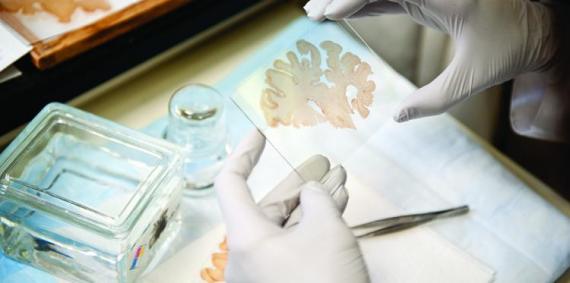ADRC researchers and collaborators work to unravel the relationships between traumatic brain injury (TBI) and Alzheimer's disease and related disorders. We are using multiple advanced brain imaging techniques, measurement of biomarkers in spinal fluid and brain tissue, and neuropsychological testing to determine these relationships in veterans who have returned from Iraq and Afghanistan, athletes who have experienced sports-related concussions, and others in the community. These studies have great promise to develop new targets for the prevention and treatment of Alzheimer's disease and related disorders.
TBI and Link to Alzheimer's and Parkinson's Diseases
From many angles, we are investigating the possibility that traumatic brain injury (TBI) serves as an environmental risk factor for Alzheimer's disease. Moderate to severe traumatic brain injury, even early in life, may increase the risk for Alzheimer's in some people. Important links are emerging in clinical and laboratory studies of the immediate, as well as long-term, brain responses to traumatic brain injury. Recent research from our center suggests that people who reach 65 years of age, and who have had a serious whack to the head earlier in life, have the same risk of Alzheimer disease as someone without a TBI.
However, in the largest ever study on the link between TBI and brain disease, Dr. Paul Crane and team found that TBI with loss of consciousness raises the risk for later life Parkinson's disease. Read: Evidence of a Brain Injury-Parkinson’s Link Strengthens
Chronic Traumatic Encephalopathy (CTE)
Dr. Dirk Keene, Leader of the ADRC Neuropathology Core, studies the plaques and tangles of brain disease under the microscope lens. He searches for the consequences of traumatic brain injury (TBI), in order to confirm a possible link to later dementia in the aging population and chronic traumatic encephalopathy (CTE) in football players. His recent research leverages the Adult Changes in Thinking Study, a collaboration between the Allen Brain Institute, Group Health Research Institute, and UW Medicine.
Unlike the general population, scientific evidence suggests that football players with multiple hits to the head risk developing a neurodegenerative condition called chronic traumatic encephalopathy (CTE), which may lead to behavioral problems and dementia. First described in boxers who became "punch drunk" in midlife, tau neurofibrillary tangles are increasingly being found in the brains of athletes who have suffered repeated concussions from head trauma.
In 2014, Keene was as one of seven neuropathologists called to serve on the first NIH national consensus forum on CTE in Washington D.C., supported by the Foundation for Sports Health Research Program and the National Football League. The panel established that the pattern of tau protein pathology of CTE is distinct from patterns characteristic of other conditions, such as Alzheimer disease or frontotemporal degeneration. They identified criteria for detecting and defining CTE in the brain, which will help clarify how many football players develop the condition and, thus, the true implications for sports. The criteria will also help researchers diagnose signs of CTE in living athletes, using PET scans that are currently under evaluation for this purpose. A better understanding of the link between pathology and symptoms will further the precision medicine goals of the ADRC.
Mild TBI in Service Members
The long-term effect of brain damage is of increasing concern to our military because of the very common brain traumas suffered by our service members in combat in Iraq and Afghanistan. UW's Dr. Elaine Peskind, former leader of the ADRC Clinical Core, leads a research effort at the Veterans Affairs Puget Sound Health Care System to better understand how TBI impacts the brain's biology. Making headway, she and Dr. Murray Raskind recently found that the cerebellum is vulnerable to mild TBI in military service members. The study’s findings suggest that scientists should pay more attention to how mild TBI affects the cerebellum to understand the emotional difficulties many veterans face.
Veterans interested in traumatic brain injury (TBI) research
Research hotline: 206-277-5566 or toll free at 800-329-8387 x65566
The Pacific Northwest Brain Donor Network
The UW ADRC Neuropathology Core runs a brain bank with the goal of helping researchers to understand the impact of mild traumatic brain injury (mTBI) on active-duty military members and veterans. Veterans can begin helping now by enrolling today, even though the tissue donation may occur many years from now.
Families and military veterans interested in the Pacific Northwest Brain Donor Network, please contact our staff at uwnp@uw.edu.
If you would like to make a financial gift to help the ADRC sustain this unique brain donor network, please visit our donations page and include a note about your specific interest in the ADRC Neuropathology Core.


